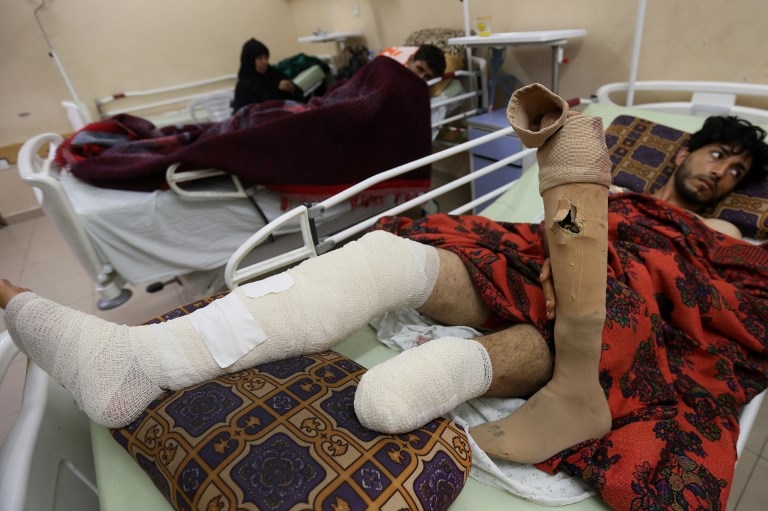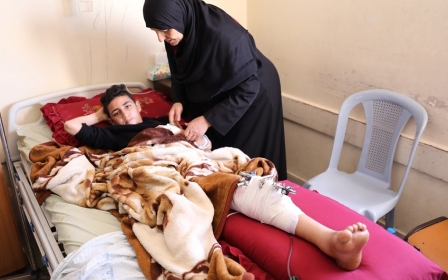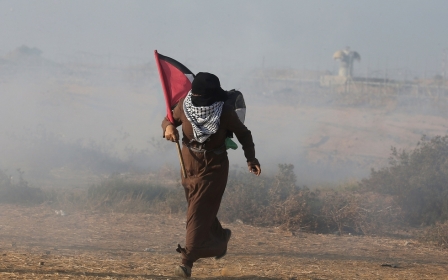Gaza hospitals 'overwhelmed' by patients with injuries from Israeli fire

Gaza's medical system is creaking under the weight of thousands of Palestinians suffering from long-term injuries caused by the Israeli army's use of live fire during months of protests, Doctors Without Borders (MSF) has warned.
The organisation said on Thursday that it has treated more than 3,000 patients since the Great March of Return protests began along Gaza's barrier with Israel at the end of March.
The vast majority of those Palestinian patients were shot in the legs, MSF said in a statement.
"A slow-motion healthcare emergency is unfolding in Gaza as the cumulative needs of patients shot by the Israeli army and seriously injured during protests mount," the group said.
'This many patients would overstretch the best healthcare systems in the world'
- Marie-Elisabeth Ingres, MSF Head of Mission in Palestine
MSF said the majority of its patients would need further medical treatment to properly heal from their wounds, or receive necessary rehabilitation.
"This burden is too much to bear for the health system in Gaza in its current form, weakened as it is by more than a decade of blockade," the group said.
Around 1,000 Palestinians shot by Israeli forces have infections that could leave them permanently crippled or even dead, the medical charity said.
MSF also noted that the large number of Palestinians wounded during the protests was having an impact on the provision of other healthcare services in the strip.
Few allowed to leave Gaza for treatment
The high number of people injured has also affected which patients can leave Gaza to seek treatment elsewhere, an official working for an international agency told MEE.
The official said the authorities in Gaza have prioritised Palestinians who were wounded during the protests, when it comes to issuing permits to leave the territory through the Egyptian border crossing.
Only around 300 people are allowed to leave Gaza per day through that crossing.
"Today we have 8,000 people suffering [from] different conditions and requiring surgery, but they are classified as 'cold cases'," the official said. "The priority is to take care of the people injured during the protests."
"I did not participate in the protests. I was just watching the protesters burn tyres and throw rocks when I was suddenly shot in my thigh," said Jadallah, who is from the al-Shati refugee camp in western Gaza City.
"My life has completely stopped. I have been waiting for the past five months to travel for treatment, but there is an overwhelming number of urgent cases that need exit permits," he said at the time.
MSF called on Israel to allow those injured out of the blockaded strip for necessary treatment and for governments to offer their medical facilities for the wounded.
"The alternative – that thousands of patients will be left to deal with terrible injuries, with many permanently disabled and dependent on their families – is unconscionable when adequate treatment is within the world's grasp," the medical charity said.
The ongoing Great March of Return protests are calling for an end to the blockade of Gaza and have been met by Israeli soldiers shooting live ammunition, tear gas and rubber bullets at demonstrators.
At least 235 Palestinians have been killed since the protests began more than seven months ago - from both Israeli fire and air strikes on the territory - while two Israeli soldiers have been killed in the same period.
Nearly 6,000 Palestinians have been injured by the Israeli army's use of live ammunition, according to the Palestinian health ministry.
"This many patients would overstretch the best healthcare systems in the world," said Marie-Elisabeth Ingres, the head of MSF’s mission in Palestine. "In Gaza, it is a crushing blow."
Stay informed with MEE's newsletters
Sign up to get the latest alerts, insights and analysis, starting with Turkey Unpacked
Middle East Eye delivers independent and unrivalled coverage and analysis of the Middle East, North Africa and beyond. To learn more about republishing this content and the associated fees, please fill out this form. More about MEE can be found here.





